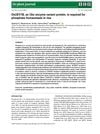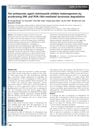 16 citations,
January 2012 in “European Journal of Endocrinology”
16 citations,
January 2012 in “European Journal of Endocrinology” The study suggests certain ACE gene variations are more common in women with PCOS and may be linked to increased insulin resistance.
 4 citations,
February 2021 in “Plant journal”
4 citations,
February 2021 in “Plant journal” OsUEV1B protein is essential for controlling phosphate levels in rice.
3 citations,
January 2023 in “Clinical cancer investigation journal” Some cannabinoid derivatives may be more effective than current drugs at targeting proteins relevant to prostate cancer treatment.
 2 citations,
June 2019 in “PubMed”
2 citations,
June 2019 in “PubMed” A specific enzyme that activates the hair growth medication minoxidil when applied to the skin was identified.
1 citations,
September 2021 in “Journal of Cosmetic Dermatology” Certain gene variations may increase the risk of hair loss in Egyptians.
 1 citations,
October 2013 in “Our Dermatology Online”
1 citations,
October 2013 in “Our Dermatology Online” 5α reductase type 2 enzyme mutation and oxidative stress may increase androgenetic alopecia risk in Egyptians.
 December 2023 in “International Journal of Pharmaceutics”
December 2023 in “International Journal of Pharmaceutics” New nanoparticles deliver plant extracts to hair follicles to treat conditions like hair loss and acne.
 November 2023 in “ACS Omega”
November 2023 in “ACS Omega” New liposome treatment successfully delivers CRISPR to deactivate a key enzyme in androgen-related disorders.
16 citations,
October 2017 in “Journal of steroid biochemistry and molecular biology/The Journal of steroid biochemistry and molecular biology” Dutasteride may protect the brain in early Parkinson's disease.
2 citations,
March 2015 in “Daehan miyong hakoeji” January 2020 in “International journal of scientific and research publications” 46 citations,
February 1983 in “The Journal of Dermatology” Hair regrowth slows with age due to changes in enzyme activity.
 April 2016 in “Annals of laboratory medicine”
April 2016 in “Annals of laboratory medicine” The method reliably profiles eicosanoids and shows epitestosterone reduces their levels, similar to common anti-inflammatory drugs.
 November 2012 in “The Journal of Urology”
November 2012 in “The Journal of Urology” Certain gene variants may raise the risk of prostate enlargement, but taking NSAIDs could reduce this risk.
 47 citations,
July 2009 in “Journal of Biological Chemistry”
47 citations,
July 2009 in “Journal of Biological Chemistry” Finasteride helps treat hair loss and prostate enlargement by blocking a specific enzyme.
 December 2023 in “Research Square (Research Square)”
December 2023 in “Research Square (Research Square)” 12-Methoxy carnosic acid from rosemary might be a good natural treatment for hair loss.
 June 2021 in “International Journal of Ayurvedic Medicine”
June 2021 in “International Journal of Ayurvedic Medicine” Phytoconstituents from Cyperus Rotundus may help treat hirsutism by interacting with the 5 α reductase enzyme.
 5 citations,
January 2022 in “Clinical cancer investigation journal”
5 citations,
January 2022 in “Clinical cancer investigation journal” Certain Dibenzo derivatives may help treat prostate cancer.
 December 2021 in “Daehanhanuihakoeji”
December 2021 in “Daehanhanuihakoeji” The traditional herbal formulas Yongdamsagan-Tang and Paljung-san, along with the drug finasteride, can reduce inflammation and may work together without affecting each other's effectiveness against benign prostatic hyperplasia.
November 2022 in “International Journal of Applied Pharmaceutics” Ergostadienol from Moringa seed oil may help prevent hair loss.
66 citations,
January 1987 in “Journal of Investigative Dermatology” Coal tar shampoo increases enzyme activity in hair follicles, enhancing carcinogen binding to DNA.
55 citations,
July 1983 in “Journal of the American Academy of Dermatology” Biotin supplements can effectively treat hair loss and skin issues in certain enzyme deficiencies.
52 citations,
March 2011 in “Clinical Gastroenterology and Hepatology” Enzyme doses for chronic pancreatitis should match meal size, not patient size.
 15 citations,
March 2015 in “Experimental Dermatology”
15 citations,
March 2015 in “Experimental Dermatology” Clotrimazole, an antifungal cream, may safely reduce skin pigmentation by breaking down the enzyme needed for making melanin.
 13 citations,
August 1995 in “The Journal of Steroid Biochemistry and Molecular Biology”
13 citations,
August 1995 in “The Journal of Steroid Biochemistry and Molecular Biology” The activity of a specific rat enzyme in the prostate and epididymis is highly dependent on the acidity level.
 1 citations,
October 2020 in “Current Drug Discovery Technologies”
1 citations,
October 2020 in “Current Drug Discovery Technologies” The research found that compound 6, a newly created steroid, is more effective at inhibiting 5α-reductase (an enzyme) than current treatments, suggesting it could be a better option for treating urinary tract symptoms in men.
 October 2024 in “Journal of the Endocrine Society”
October 2024 in “Journal of the Endocrine Society” Certain genetic variants reduce enzyme activity, contributing to non-classic congenital adrenal hyperplasia.
 October 2024 in “Journal of the Endocrine Society”
October 2024 in “Journal of the Endocrine Society” Certain genetic variants impair enzyme activity, contributing to non-classic congenital adrenal hyperplasia.
 November 2022 in “Journal of the Endocrine Society”
November 2022 in “Journal of the Endocrine Society” Estrogen deficiency can reduce the enzyme activity needed to activate vitamin D.


















